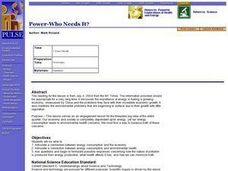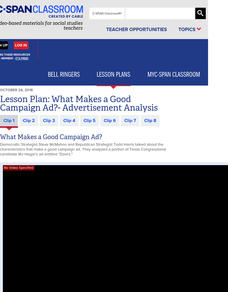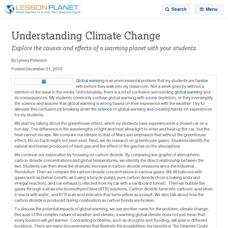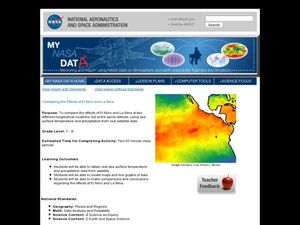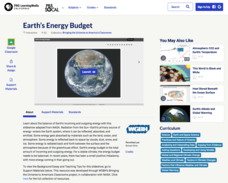Curated OER
The Little Ice Age - Understanding Climate and Climate Change
Fourth graders receive data about tree ring records, solar activity, and volcanic eruptions during the Little Ice Age (1350-1850). From this data, they draw conclusions about possible natural causes of climate change
Curated OER
Be Considerate of Others
Students explore the environment by participating in an outdoors activity. In this nature appreciation lesson, students discuss how to minimize their human imprint when experiencing nature. Students conduct a nature walk and plan out an...
National Wildlife Federation
Hot, Hotter, Hottest: Extreme Weather's Impact on Our Resources
How dry is it? It's so dry, the river only runs twice a week! Through an analysis of maps and discussions, pairs learn about droughts across the United States in the ninth of 12 lessons. They then read about, answer questions, analyze...
Chicago Botanic Garden
Carbon, Greenhouse Gases, and Climate
Climate models mathematically represent the interactions of the atmosphere, oceans, land, sun, surface, and ice. Part two in the series of four lessons looks at the role greenhouse gases play in keeping Earth warm and has participants...
Curated OER
Who Needs Power?
Students articulate the connection between energy consumption and the global economy. They identify and define the connection between energy consumption and environmental health. Students formulate suggestions concerning how the nature...
Curated OER
Health, Pollution, and Safety: Why Should We Care?
Students examine the impact of reducing the carbon dioxide emissions. They identify ways alternative fuels can lessen the effect of emissions on communities. Working in teams they conduct research from various community and Internet...
Curated OER
The Water Cycle and Global Warming
Students study the flow of water in the environment. In this water cycle lesson students evaluate the consequences of changes in the water cycle using data.
Curated OER
Global Warming: The Greenhouse Effect Visualizer
Learners work in small groups to study the various aspects of global weather and discuss the possibility of a Greenhouse Effect.
American Museum of Natural History
What do you Know About Climate Change?
Test the class's knowledge of the key components of climate change. A 10-question online quiz asks learners about weather, climate, greenhouse gases, and several other concepts related to climate change. Interactive and easy for...
National Park Service
Biodiversity—Bee Week
If you want scholars to fall in love with bees, this is the unit for you! Celebrate bees with a full week of material—designed for the Next Generation Science Standards—that addresses the importance of pollination and fertilization....
Wild BC
Is Climate Change Good for Us?
Is it really that big of a deal if the global climate undergoes a little change? Young environmentalists consider this very question as they discuss in small groups the impact of different climate change scenarios on their lives,...
C-SPAN
What Makes a Good Campaign Ad?- Advertisement Analysis
In the time of a hotly contested presidential election, campaign ads are almost ubiquitous—but what makes them good? Using ads from the 2018 midterm elections, learners consider the various strategies candidates use to get the vote....
Curated OER
Watershed Ways
Students connect the water cycle concept with local fresh water availability and consumption. They identify waterways in their own region. Students define, predict, research, and map local watershed areas. They research the positive...
Curated OER
What Factors Impact a Greenhouse?
Young scholars analyze the Greenhouse Effect and the science of greenhouses. For this global climate lesson, students read background information about the 'greenhouse effect' and define 'albedo.' Young scholars examine pictures of...
Curated OER
Understanding Climate Change
Explore the causes and effects of a warming planet with your students.
Curated OER
The Gray Whale Obstacle Course Viewing Guide
Students complete a worksheet while watching a film about whales. They examine the human impact on whale migration and identify adaptations the whale has acquired in able to survive. They discover how global warming has effected the...
Curated OER
Comparing the Effects of El Nino and La Nina
Students examine the differences between an El Nino and La Nina year. In this investigative lesson plan students create maps and graphs of the data they obtained.
C-SPAN
Voting Discrimination and the Effects of Shelby County v. Holder
Show students that every vote counts as they debate the federal government 's role in protecting voting rights in historically racially discriminated areas. In the Supreme Court case Shelby County v. Holder, the high court found...
Curated OER
Possible Causes
Students review any materials from two previous lessons on emissions. As a class, they use a graphic organizer to review their stakeholder's hypothesis. They identify possible causes of global warming and discover how to solve this problem.
Curated OER
Invisible Invaders
Young scholars research various epidemics that have devastated the world population focusing on the historical events taking place during the times of the epidemics and the epidemics' effects on these societies.
Curated OER
Feeling the Heat
Students investigate the urban heat island effect. For this urban heat island effect lesson, students learn how trees, grass, asphalt, and other things on the school grounds effect temperature. They use the information to generalize it...
Curated OER
Greenhouse Gases: The Chemistry Behind the Culprits
Ninth graders investigate the effect of different gases in the atmosphere. In this chemistry lesson, 9th graders explain how these gases contribute to global warming. They suggest possible solutions to this growing problem.
Curated OER
Glacier Climbing
Students discuss glaciers and the current distribution of glaciers around the Earth. They create simulated glaciers using cornstarch, shoeboxes, water, and pebbles.
PBS
Earth’s Energy Budget
Is Earth's energy flow a little off balance? Explore our energy budget using a click-through interactive. Scholars discover the many factors that move solar energy around the planet and why the system is no longer in equilibrium.




